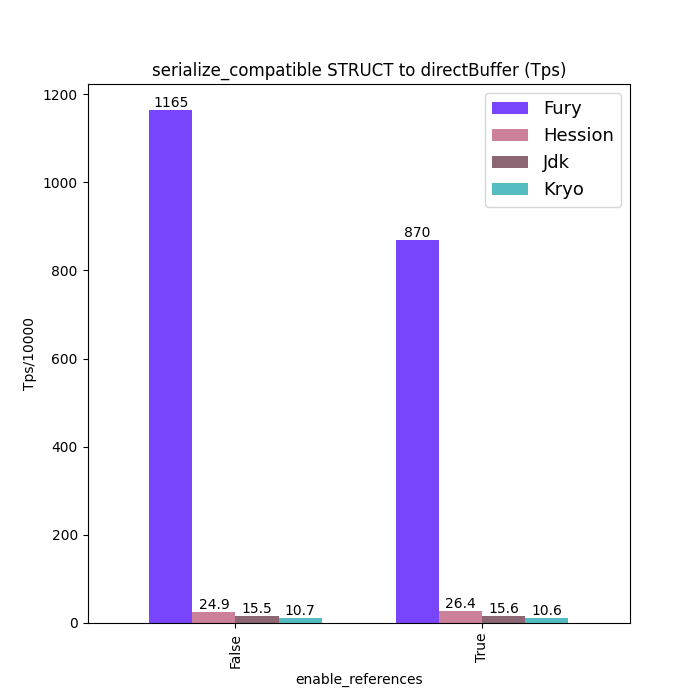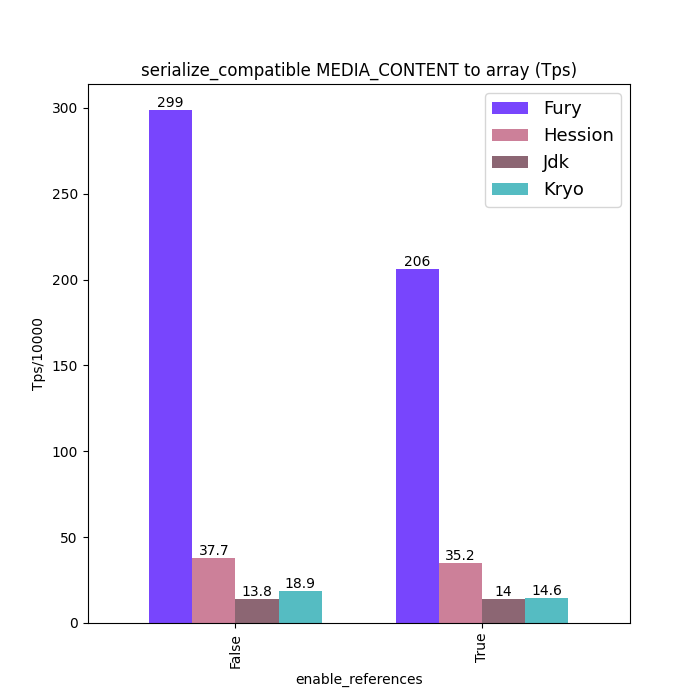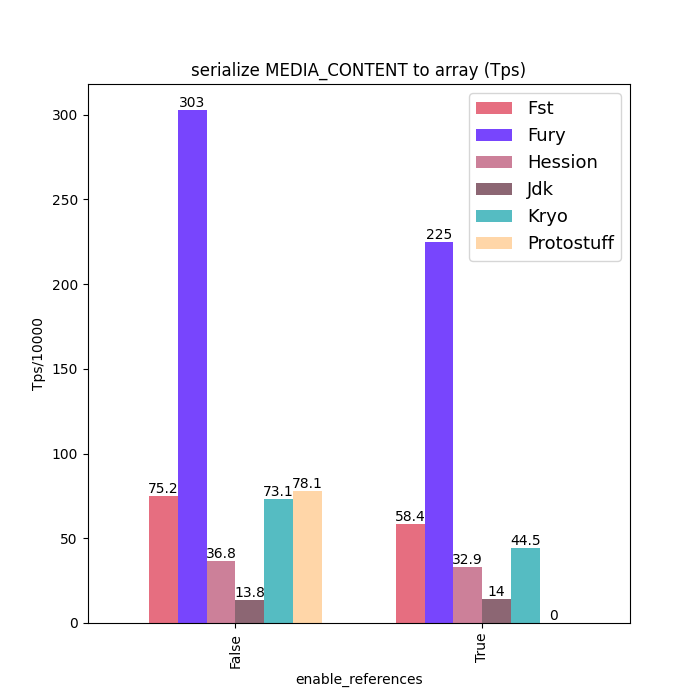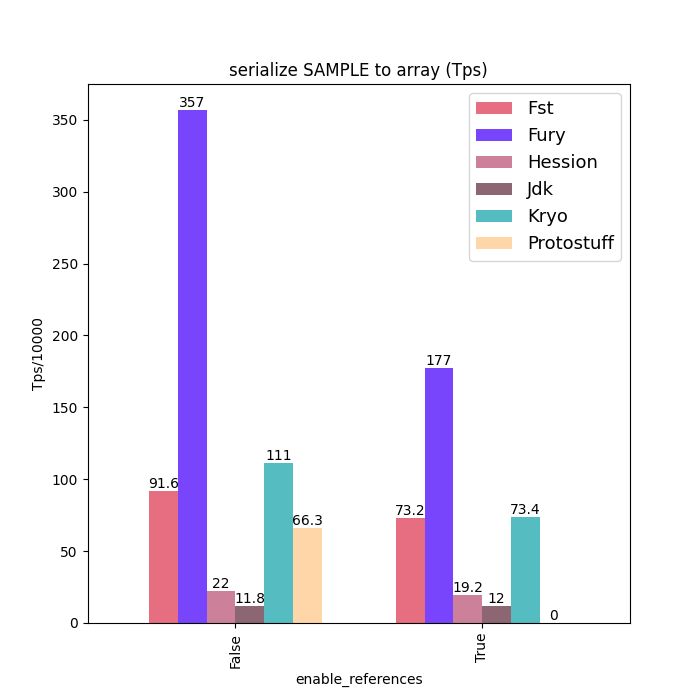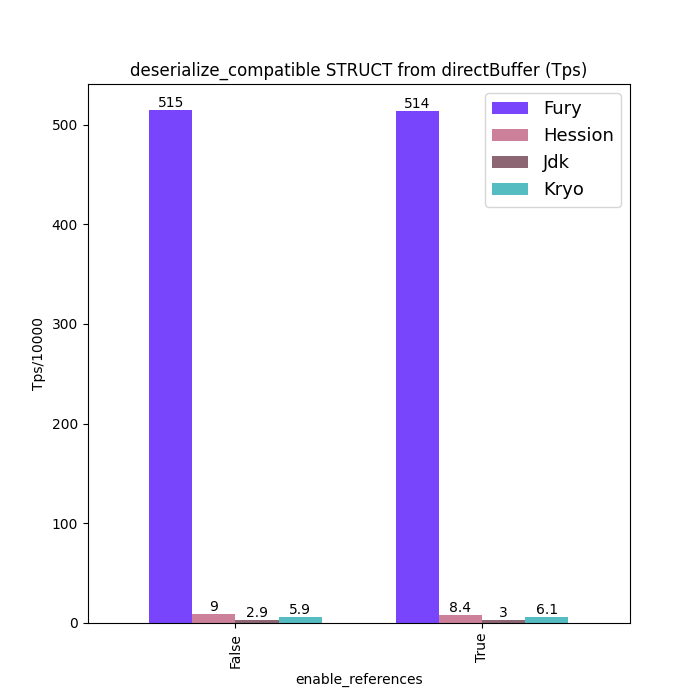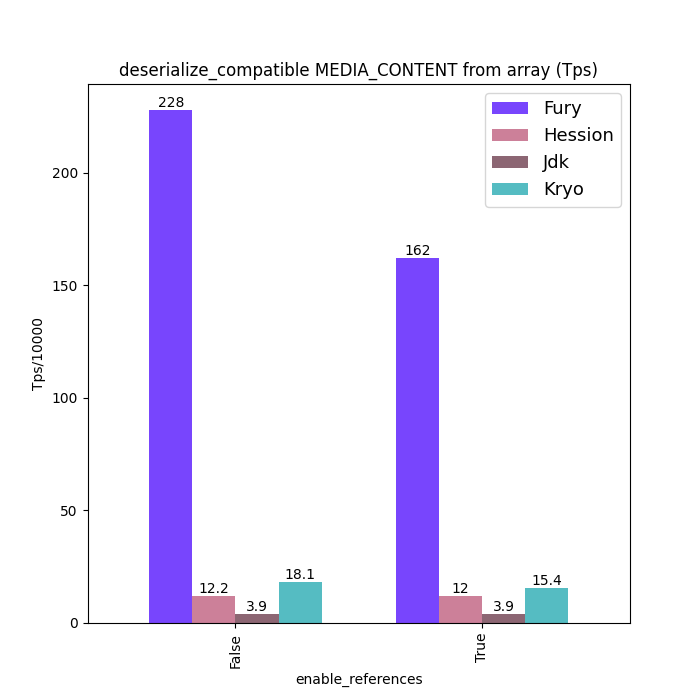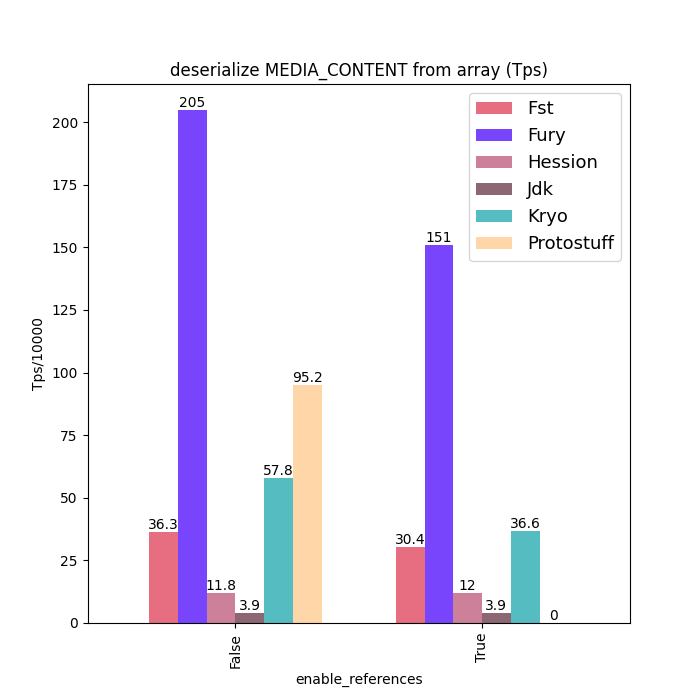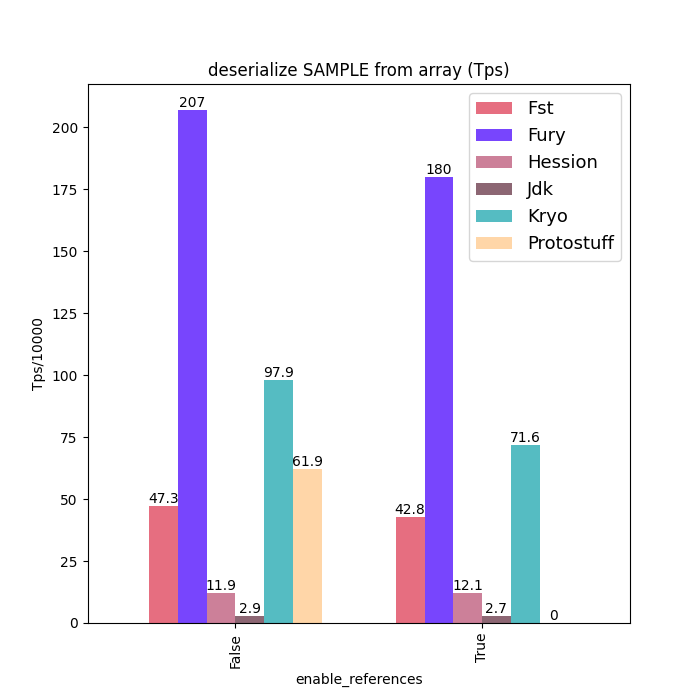Fury is a blazing fast multi-language serialization framework powered by jit(just-in-time compilation) and zero-copy, providing up to 170x performance and ultimate ease of use.
- Multiple languages: Java/Python/C++/Golang/Javascript.
- Zero-copy: cross-language out-of-band serialization inspired by pickle5 and off-heap read/write.
- High performance: A highly-extensible JIT framework to generate serializer code at runtime in an async multi-thread way to speed serialization, providing 20-170x speed up by:
- reduce memory access by inline variable in generated code.
- reduce virtual method invocation by inline call in generated code.
- reduce conditional branching.
- reduce hash lookup.
- Multiple binary protocols: object graph, row format and so on.
In addition to cross-language serialization, Fury also features at:
- Drop-in replace Java serialization frameworks such as JDK/Kryo/Hessian without modifying any code, but 100x faster. It can greatly improve the efficiency of high-performance RPC calls, data transfer and object persistence.
- JDK serialization 100% compatible, support java custom serialization
writeObject/readObject/writeReplace/readResolve/readObjectNoDatanatively. - Supports shared and circular reference object serialization for golang.
- Supports automatic object serialization for golang.
Different scenarios have different serialization requirements. Fury designed and implemented multiple binary protocols for those requirements:
- Cross-language object graph protocol:
- Cross-language serialize any object automatically, no need for IDL definition, schema compilation and object to/from protocol conversion.
- Support shared reference and circular reference, no duplicate data or recursion error.
- Support object polymorphism.
- Native java/python object graph protocol: highly-optimized based on type system of the language.
- Row format protocol: a cache-friendly binary random access format, supports skipping serialization and partial serialization, and can convert to column-format automatically.
New protocols can be added easily based on fury existing buffer, encoding, meta, codegen and other capabilities. All of those share same codebase, and the optimization for one protocol can be reused by another protocol.
Different serialization frameworks are suitable for different scenarios, and benchmark results here are for reference only.
If you need to benchmark for your specific scenario, make sure all serialization frameworks are appropriately configured for that scenario.
Dynamic serialization frameworks supports polymorphism and reference, which has more cost compared to static serialization frameworks, unless it uses the jit techniques as fury did. Since fury will generate code at runtime, please warm up before collecting benchmark statistics.
Title containing "compatible" represent schema compatible mode: support type forward/backward compatibility.
Title without "compatible" represent schema consistent mode: class schema must be same between serialization and deserialization.
Struct is a class with 100 primitive fields, MediaContent is a class from jvm-serializers, Sample is a class from kryo benchmark.
See benchmarks for more benchmarks about type forward/backward compatibility, off-heap support, zero-copy serialization.
Nightly snapshot:
<repositories>
<repository>
<id>sonatype</id>
<url>https://s01.oss.sonatype.org/content/repositories/snapshots</url>
<releases>
<enabled>false</enabled>
</releases>
<snapshots>
<enabled>true</enabled>
</snapshots>
</repository>
</repositories>
<dependency>
<groupId>org.furyio</groupId>
<artifactId>fury-core</artifactId>
<version>0.1.0-SNAPSHOT</version>
</dependency>
<!-- row/arrow format support -->
<!-- <dependency>
<groupId>org.furyio</groupId>
<artifactId>fury-format</artifactId>
<version>0.1.0-SNAPSHOT</version>
</dependency> -->Release version:
<dependency>
<groupId>org.furyio</groupId>
<artifactId>fury-core</artifactId>
<version>0.1.0-alpha.1</version>
</dependency>
<!-- row/arrow format support -->
<!-- <dependency>
<groupId>org.furyio</groupId>
<artifactId>fury-format</artifactId>
<version>0.1.0-alpha.1</version>
</dependency> --># Python whl will be released soon.
# Currently you need to install from the source.
git clone https://github.com/alipay/fury.git
cd fury/python
pip install -v -e .npm install @furyjs/furyComing soon.
Here we give a quick start about how to use fury, see user guide for more details about java, cross language, and row format.
If you don't have cross-language requirements, using this mode will have better performance.
import io.fury.Fury;
import java.util.List;
import java.util.Arrays;
public class Example {
public static void main(String[] args) {
SomeClass object = new SomeClass();
// Note that Fury instances should be reused between
// multiple serializations of different objects.
{
Fury fury = Fury.builder().withLanguage(Language.JAVA)
.withRefTracking(true)
// Allow to deserialize objects unknown types,
// more flexible but less secure.
// .withSecureMode(false)
.build();
// Registering types can reduce class name serialization overhead, but not mandatory.
// If secure mode enabled, all custom types must be registered.
fury.register(SomeClass.class);
byte[] bytes = fury.serialize(object);
System.out.println(fury.deserialize(bytes));
}
{
ThreadSafeFury fury = Fury.builder().withLanguage(Language.JAVA)
// Allow to deserialize objects unknown types,
// more flexible but less secure.
// .withSecureMode(false)
.withRefTracking(true)
.buildThreadSafeFury();
byte[] bytes = fury.serialize(object);
System.out.println(fury.deserialize(bytes));
}
{
ThreadSafeFury fury = new ThreadLocalFury(classLoader -> {
Fury f = Fury.builder().withLanguage(Language.JAVA)
.withRefTracking(true).withClassLoader(classLoader).build();
f.register(SomeClass.class);
return f;
});
byte[] bytes = fury.serialize(object);
System.out.println(fury.deserialize(bytes));
}
}
}Java
import com.google.common.collect.ImmutableMap;
import io.fury.*;
import java.util.Map;
public class ReferenceExample {
public static class SomeClass {
SomeClass f1;
Map<String, String> f2;
Map<String, String> f3;
}
public static Object createObject() {
SomeClass obj = new SomeClass();
obj.f1 = obj;
obj.f2 = ImmutableMap.of("k1", "v1", "k2", "v2");
obj.f3 = obj.f2;
return obj;
}
// mvn exec:java -Dexec.mainClass="io.fury.examples.ReferenceExample"
public static void main(String[] args) {
Fury fury = Fury.builder().withLanguage(Language.XLANG)
.withRefTracking(true).build();
fury.register(SomeClass.class, "example.SomeClass");
byte[] bytes = fury.serialize(createObject());
// bytes can be data serialized by other languages.
System.out.println(fury.deserialize(bytes));
;
}
}Python
from typing import Dict
import pyfury
class SomeClass:
f1: "SomeClass"
f2: Dict[str, str]
f3: Dict[str, str]
fury = pyfury.Fury(ref_tracking=True)
fury.register_class(SomeClass, "example.SomeClass")
obj = SomeClass()
obj.f2 = {"k1": "v1", "k2": "v2"}
obj.f1, obj.f3 = obj, obj.f2
data = fury.serialize(obj)
# bytes can be data serialized by other languages.
print(fury.deserialize(data))Golang
package main
import furygo "github.com/alipay/fury/fury/go/fury"
import "fmt"
func main() {
type SomeClass struct {
F1 *SomeClass
F2 map[string]string
F3 map[string]string
}
fury := furygo.NewFury(true)
if err := fury.RegisterTagType("example.SomeClass", SomeClass{}); err != nil {
panic(err)
}
value := &SomeClass{F2: map[string]string{"k1": "v1", "k2": "v2"}}
value.F3 = value.F2
value.F1 = value
bytes, err := fury.Marshal(value)
if err != nil {
}
var newValue interface{}
// bytes can be data serialized by other languages.
if err := fury.Unmarshal(bytes, &newValue); err != nil {
panic(err)
}
fmt.Println(newValue)
}public class Bar {
String f1;
List<Long> f2;
}
public class Foo {
int f1;
List<Integer> f2;
Map<String, Integer> f3;
List<Bar> f4;
}
Encoder<Foo> encoder = Encoders.bean(Foo.class);
Foo foo = new Foo();
foo.f1 = 10;
foo.f2 = IntStream.range(0, 1000000).boxed().collect(Collectors.toList());
foo.f3 = IntStream.range(0, 1000000).boxed().collect(Collectors.toMap(i -> "k"+i, i->i));
List<Bar> bars = new ArrayList<>(1000000);
for (int i = 0; i < 1000000; i++) {
Bar bar = new Bar();
bar.f1 = "s"+i;
bar.f2 = LongStream.range(0, 10).boxed().collect(Collectors.toList());
bars.add(bar);
}
foo.f4 = bars;
// Can be zero-copy read by python
BinaryRow binaryRow = encoder.toRow(foo);
// can be data from python
Foo newFoo = encoder.fromRow(binaryRow);
// zero-copy read List<Integer> f2
BinaryArray binaryArray2 = binaryRow.getArray(1);
// zero-copy read List<Bar> f4
BinaryArray binaryArray4 = binaryRow.getArray(4);
// zero-copy read 11th element of `readList<Bar> f4`
BinaryRow barStruct = binaryArray4.getStruct(10);
// zero-copy read 6th of f2 of 11th element of `readList<Bar> f4`
barStruct.getArray(1).getLong(5);
Encoder<Bar> barEncoder = Encoders.bean(Bar.class);
// deserialize part of data.
Bar newBar = barEncoder.fromRow(barStruct);
Bar newBar2 = barEncoder.fromRow(binaryArray4.getStruct(20));@dataclass
class Bar:
f1: str
f2: List[pa.int64]
@dataclass
class Foo:
f1: pa.int32
f2: List[pa.int32]
f3: Dict[str, pa.int32]
f4: List[Bar]
encoder = pyfury.encoder(Foo)
foo = Foo(f1=10, f2=list(range(1000_000)),
f3={f"k{i}": i for i in range(1000_000)},
f4=[Bar(f1=f"s{i}", f2=list(range(10))) for i in range(1000_000)])
binary: bytes = encoder.to_row(foo).to_bytes()
foo_row = pyfury.RowData(encoder.schema, binary)
print(foo_row.f2[100000], foo_row.f4[100000].f1, foo_row.f4[200000].f2[5])Fury java object graph serialization support class schema forward/backward compatibility. The serialization peer and deserialization peer can add/delete fields independently.
We plan to add support cross-language serialization after meta compression are finished.
We are still improving our protocols, binary compatibility are not ensured between fury releases for now. Please shade fury if you will upgrade fury in the future.
Binary compatibility will be ensured before fury 1.0.
Static serialization are secure. But dynamic serialization such as fury java/python native serialization supports deserialize unregistered types, which provides more dynamics and flexibility, but also introduce security risks.
For example, the deserialization may invoke init constructor or equals/hashCode method, if the method body contains malicious code, the system will be at risks.
Fury provides a secure mode option and enabled by default for such protocols, which allows only deserializing trusted registered types or built-in types. Do not disable secure mode or class registration checks unless you can ensure your environment is indeed secure.
- Meta compression, auto meta sharing and cross-language schema compatibility.
- AOT Framework for c++/golang/rust to generate code statically.
- C++/Rust object graph serialization support
- Golang/Rust/NodeJS row format support
- ProtoBuffer compatibility support
- Protocols for features and knowledge graph serialization
- Continuously improve our serialization infrastructure for any new protocols
Please read our project development guide.
| Platform | Purpose | Estimated Response Time |
|---|---|---|
| GitHub Issues | For reporting bugs and filing feature requests. | < 1 days |
| Slack | For collaborating with other Fury users and latest announcements about Fury. | < 2 days |
| StackOverflow | For asking questions about how to use Fury. | < 2 days |
| Zhihu Twitter Youtube | Follow us for latest announcements about Fury. | < 2 days |
| WeChat Official Account(微信公众号) / Dingding Group(钉钉群) | < 2 days |

